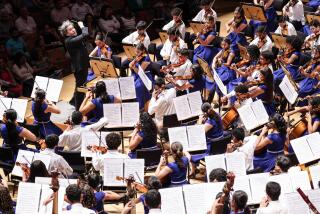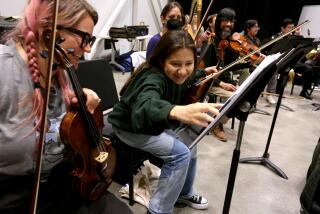TV Reviews : Leningrad Philharmonic Shines for Tchaikovsky
Seven months after his 150th birthday, Piotr Ilyich Tchaikovsky last December was feted by the Leningrad Philharmonic in the orchestra’s Great Hall in its home city. The resulting television concert of familiar music by the great Russian composer can be seen at 6 p.m. Sunday on KCET Channel 28.
Except for 21-year-old Soviet pianist Boris Berezovsky--gold medalist in the 1990 International Tchaikovsky Competition--who plays a concerto movement, all the soloists are Americans. Under Yuri Temirkanov, they sometimes produce authentic Tchaikovskian excitement.
The Leningrad Philharmonic, heard by itself only in the “1812” Overture and the Polonaise from “Evgeny Onegin,” is the star of this presentation, however, giving the masterly Temirkanov all the emotional variety, plasticity of line and polished execution he demands. Then, in the solo pieces, conductor and orchestra produce wondrous and flexible collaborations with the featured performers.
Of the four, the most admirable on this occasion is the impassioned but controlled Yo-Yo Ma, whose cello playing makes the ubiquitous “Rococo” Variations sound fresh and important; he is beautifully seconded by Temirkanov & Co.
Most reliable is violinist Itzhak Perlman, who brings solid musical values--despite too-close miking, which seems to add sand to his tone--to the “Serenade Melancolique” and the “Valse-Scherzo.”
Most handsome is Jessye Norman, in her Soviet Union debut, who sings three of the six French Songs of Opus 65 giddily or seriously, as required, but does not dig deep into “Adieu, forets,” from “Jeanne d’Arc.” Her tone proves inconsistent--beauteous and full at times, hollow or reedy at others.
As in some of her televised opera performances, Norman seems to play at any given moment the role of the diva rather than a believable character. In a flowing, royal purple gown and with her black hair coiffed heroically, she looks grand, however. In the three songs with piano, she is accompanied authoritatively by Evgeny Shenderovich.
Most intriguing is Berezovsky, whose brief appearance in the finale of the First Piano Concerto promises much while delivering predictable, well-drilled virtuosity for just a few minutes.
Charles Kuralt introduces each part of the program unobtrusively.
More to Read
The biggest entertainment stories
Get our big stories about Hollywood, film, television, music, arts, culture and more right in your inbox as soon as they publish.
You may occasionally receive promotional content from the Los Angeles Times.










